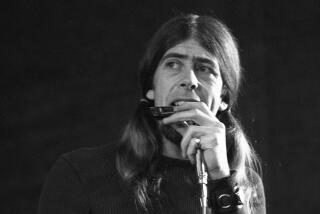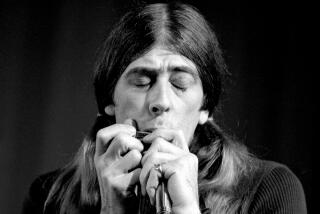Curtis Mayfield; R&B; Songwriter, Singer, Guitarist With Gospel Roots
- Share via
Curtis Mayfield, a songwriter who sang against social injustice with an almost spiritual eloquence that made him the conscience of R&B; music in the ‘60s and ‘70s, died Sunday. He was 57.
Warner Bros. Records spokeswoman Karen Lee announced the death in Los Angeles. A nurse at North Fulton Regional Hospital in Roswell, Ga., confirmed that Mayfield died there Sunday morning.
The cause of his death was not immediately available. Funeral arrangements were incomplete.
Mayfield--an acclaimed singer, guitarist and songwriter who recorded for such labels as ABC-Paramount and his own Curtom Records during the peak of his career--never benefited from the promotional muscle of a label like Motown in the ‘60s and ‘70s, but the quality and influence of his music made him the equal of such Motown giants as Marvin Gaye and Smokey Robinson.
Among his more than three dozen R&B; Top 20 hits on his own and with the Impressions vocal group were such black pride commentaries as “Keep on Pushing” and “We’re a Winner.”
“Stevie Wonder and Marvin Gaye were major R&B; artists whose music contained social messages, but Mayfield’s music was virtually built around social messages,” Times Pop Music Critic Robert Hilburn said Sunday. “His most affecting songs carried the optimism and conviction of the Rev. Martin Luther King Jr.’s most celebrated sermons. His music was a major influence on many of today’s most influential rap and hip-hop stars, from Lauryn Hill to Public Enemy.”
For Mayfield, music wasn’t just a career, but a life’s mission--a sharing of his own social aspirations and beliefs.
“The way I feel is that everyone shares the same sensitivities,” he told The Times’ Chuck Philips in an interview some years ago. “We all laugh and we all cry. No matter what race or economic level you are part of, the music I try to compose touches people because it speaks on being human.”
Mayfield’s musical roots dated back to the church choirs of his youth, and he brought much of the celebration and joy of those gospel tunes to his live performances. While the public responded enthusiastically to his music, it viewed him with such respect that his concerts at times seemed to take on a spiritual aura.
His string of hits over the years included “Gypsy Woman,” the gospel-tinged “People Get Ready” and the funk classic “Superfly” from the 1972 movie of the same name. Mayfield’s soundtrack to “Superfly” sold well over 12 million copies.
But his career included terrible tragedy as well. After nearly a decade of performing in anonymity, he was paralyzed from the neck down in a freak accident in 1990 when he was struck by a rig that toppled while he was on stage in Brooklyn. The third, fourth and fifth vertebrae in his neck were broken. Mayfield’s condition deteriorated over the years, and doctors were forced to amputate his right leg last year because of diabetes.
Just last March, he was too ill to attend a ceremony for his induction into the Rock and Roll Hall of Fame. He became a Grammy Legend Award winner in 1994 and a Grammy Lifetime Achievement Award winner the following year.
Born on the North Side of Chicago, Mayfield developed a flair for high-tenor singing in the choir of his grandmother’s Traveling Soul Spiritualists’ Church. He would later become one of the few artists to make it onto pop charts with gospel-oriented compositions.
Mayfield got his first guitar at the age of 10, and later said he loved the instrument so much he used to sleep with it. He grew up admiring legendary blues singer Muddy Waters and the great Spanish guitarist Andres Segovia, but was basically self-taught on the instrument.
“As a child, I heard all these melodic ideas floating around in my head,” Mayfield, who became an extraordinary R&B; guitarist, told Philips. “I guess that’s where the fit lies. No one taught me; I just found my own way.”
His own way led him to join the Rooster--a group made up of friends from church that included Jerry Butler, brothers Arthur and Richard Brooks, and Sam Gooden--in 1956.
Two years later the group was renamed the Impressions. Its first hit, “For Your Precious Love,” made it to No. 11 in the United States. Butler left the group to strike out on his own, but Mayfield continued through the ‘60s with a string of hits, including “He Will Break Your Heart,” “Need to Belong to Someone” and “Find Yourself Another Girl.”
After recording several critically praised solo albums in the early ‘70s--”Back to the World,” “Sweet Exorcist,” “Got to Find a Way” and “There’s No Place Like America Today”--he produced two albums for Aretha Franklin, “Sparkle” and “Almighty Fire.”
As a writer of film soundtracks, Mayfield found success in 1974 with “Claudine,” featuring Gladys Knight and the Pips. A year later he did the music for “Let’s Do It Again,” which featured the Staple Singers.
In 1982, he moved his studio and Curtom Records from Chicago to Atlanta, where he was living when he died.
A devoted family man, Mayfield decided to keep a low profile after the initial “Superfly” success to spend more time at home.
“Music is a big part of my personality, but for me, the master plan covers a whole lot more ground than that,” Mayfield told Philips. “It’s about fulfillment. You see, I have wonderful children. I believe in being involved with my family. . . . I lead a full life.”
His last album, “New World Order,” was released in 1996.
Mayfield is survived by his wife, Altheida; his mother; 10 children; two sisters; a brother; and seven grandchildren.
More to Read
The biggest entertainment stories
Get our big stories about Hollywood, film, television, music, arts, culture and more right in your inbox as soon as they publish.
You may occasionally receive promotional content from the Los Angeles Times.









